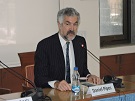OOn 10 February 2016, the VIF invited Daniel Pipes, an internationally acclaimed scholar on radical Islam and the President of the Middle East Forum, for an interaction on Islamism and the politico-religious dimensions of the conflict in the Middle East, followed by an interactive session. Through the session which lasted for about an hour and half and was divided equally between the presentation and the time spent on Q&A session, Daniel Pipes made some very useful, interesting and thought provoking observations about Islamism, branding it not as a perversion of Islam but as another form of Islam, which the radical Islamists across the Middle East are trying to impose on the free secular world.
 He however stressed that the political version of Islam practiced in countries like Turkey is far more threatening than the violent form of Islam practiced by the Islamic State (IS). Continuing in the same vein, he argued that Islamists who work within the system, especially in countries like the United States and India, are even more threatening than the IS. Until now, liberal democracies around the world haven’t quite figured out how to counter the political Islamists. Pipes however predicted the end of Islamic State in the next couple of years, given the internal squabbles within the greater Islamist movement, but even more prominently, its dwindling resource bases - power, influence, territories, finances etc., especially the rejection of its violent ideology by the larger Muslim world. The consensus view that emerged from the ensuing interaction however underlined that while the Islamic State may be gone, the mutations would still survive and the ideology might still live on. It was further highlighted that the moderate versions of Islam, especially the kind of which is practiced in India and a few Southeast Asian countries, Sufi Islam et al. need to be given greater prominence to defeat the growth of radical Islam across the world.
He however stressed that the political version of Islam practiced in countries like Turkey is far more threatening than the violent form of Islam practiced by the Islamic State (IS). Continuing in the same vein, he argued that Islamists who work within the system, especially in countries like the United States and India, are even more threatening than the IS. Until now, liberal democracies around the world haven’t quite figured out how to counter the political Islamists. Pipes however predicted the end of Islamic State in the next couple of years, given the internal squabbles within the greater Islamist movement, but even more prominently, its dwindling resource bases - power, influence, territories, finances etc., especially the rejection of its violent ideology by the larger Muslim world. The consensus view that emerged from the ensuing interaction however underlined that while the Islamic State may be gone, the mutations would still survive and the ideology might still live on. It was further highlighted that the moderate versions of Islam, especially the kind of which is practiced in India and a few Southeast Asian countries, Sufi Islam et al. need to be given greater prominence to defeat the growth of radical Islam across the world.
Another notable feature of the talk delivered by Daniel Pipes was his recognition of the confrontation between the Iran-led revolutionary Shi’ite bloc
 on one side and the Saudi-led Sunni status quo bloc as the raison d'être for the ongoing conflict across the Middle East. All other conflicts, including the terror spawned by and represented by the ISIS is a secondary, and probably temporary and short-term phenomena. In so far as the situation in Syria and Iraq is concerned, the conflict has reached a point where it is most likely that the divisions that exist within these countries will only deepen and widen. Both have a Shia dominated central government, both have Sunni rebellions, and both have a Kurdish separatist movement that wants nothing to do with either the Shia government or the Sunni rebels.
on one side and the Saudi-led Sunni status quo bloc as the raison d'être for the ongoing conflict across the Middle East. All other conflicts, including the terror spawned by and represented by the ISIS is a secondary, and probably temporary and short-term phenomena. In so far as the situation in Syria and Iraq is concerned, the conflict has reached a point where it is most likely that the divisions that exist within these countries will only deepen and widen. Both have a Shia dominated central government, both have Sunni rebellions, and both have a Kurdish separatist movement that wants nothing to do with either the Shia government or the Sunni rebels.
With Lt Gen (retd) Ravi Sawhney, former DGMI, chairing the session, Sultan Shahin, the Indian editor of NewAgeIslam.com, CD Sahay, former Chief R&AW, Tilak Devasher, former Special Secretary, Cabinet Secretariat, Government of India, Amb Rajiv Sikri, former Secretary, Ministry of External Affairs, India, Rajiv Mathur, former Chief, the Intelligence Bureau, Ashok Sajjanhar, among others, participated in the discussions.



